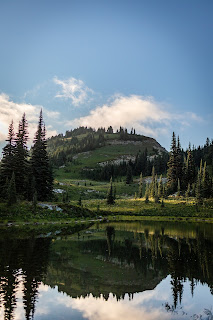Blissful Hiking Adventures is proud to announce a series of blogs on great hiking, adventure, and opportunity in our national parks in the USA.
To kick-off, we welcome Ten Adventures founder Richard Campbell with the best hikes in Mount Rainier National Park. Permitting for many backcountry camping and hiking in the parks begins soon. Plan your adventures now!
Must-Do Hikes in Mount Rainier National Park for Every Skill Level
Majestic Mount Rainier is the gem of Washington State, and the national park that surrounds it covers nearly 370 square miles of pristine wilderness. 14,409-foot Mount Rainier, originally named Tahoma, stands guard over the park, consisting of rolling carpets of wildflowers, old-growth forests, crystalline lakes, and rugged mountains. Mount Rainier National Park is a premier destination that sees over 2 million annual visitors. In a place like this it can be hard to choose where to start, so here are 3 exceptional hikes in the park: one for beginners, one for intermediate hikers, and one for advanced adventurers.
Best Beginner
Hike: Naches Peak Loop
When
picking a hiking
route for beginners, it is always best to picture the least outdoorsy person
and start from there. Take into consideration how much distance and elevation gain they
could realistically handle, and how good the views would
have to be to make them feel like the hike was worthwhile. Ideally, you end up
with a hike that’s forgiving on the body but big on scenery, which is exactly what the
Naches Peak Loop is.
The Naches Peak Loop is 3.5 miles roundtrip and only gains about 500 feet of elevation, which should be within the realm of possibility for most visitors to the park. Beginning at beautiful Tipsoo Lake, the hike starts off on a high note before you’ve even gotten out of your car. From Tipsoo, the hike climbs to a perfect viewpoint over Dewey Lake at the midpoint. Along the way, you’ll be trekking through a wide sea of wildflowers with Mount Rainier standing tall right ahead of you.
As you circumnavigate Naches Peak, the hike follows a stretch of the Pacific Crest Trail (PCT). This gives you the opportunity to explain the trials and tribulations of thru-hiking is to your least outdoorsy friend, which is almost guaranteed to garner a hilarious reaction.Best Intermediate Hike: Skyline
Trail
The
Skyline Trail should definitely be considered an essential hike at Mount Rainier National Park. Yes, essential often means
busy, but it’s worth sacrificing solitude for scenery on this route. The Skyline
Trail circles the well-known and well-loved Paradise area of the park. Paradise
it is indeed, with summits, wildflowers, and forests enchanting you from every
angle. The hike is 5.5 miles long with about 1700 feet of elevation gain,
letting you get a sweat on without being too demanding.
The Skyline Trail begins from the Henry M. Jackson Visitor Center. You can do the loop either way, but most people seem to go clockwise. The wildflowers are excellent in the summertime, but no matter what time of year you do this hike, you’ll be astounded by how close Mount Rainier seems to be. The view of the Nisqually Glacier is great, and you can see as far as Mount Hood on a clear day. This is one trail that, no matter how many times you have hiked it, will always leave you feeling as satisfied as the first time.
Best Advanced Hike: Wonderland Trail
Something about the Pacific Northwest just makes you want to stay awhile, and Mount Rainier National Park is no exception. If you’re a strong hiker and want to stretch your adventure into a backpacking trip, the Wonderland Trail is definitely one to aspire to. After all, where else to start than Mount Rainier itself? This route is 93 miles long with more elevation gain and loss than you’d care to keep track of (it’s about 3,500 feet per day for those who want to know what they’re getting into). It’s a big trip that is only recommended for very strong hikers, but it’ll never leave the back of your mind after you do it.
The Wonderland Trail encircles Mount Rainier. Starting from Longmire, there are 21 campsites,18 wilderness sites, and three non-wilderness sites to make use of along the way. While that seems like a lot, you’ll definitely want to sit down ahead of time to work out how far you’ll go each day and which camps you’ll need to book ahead of time. When you’re actually out on the trail, the mountain will preside over you every step of the way, and you’ll be able to appreciate it and the surrounding park in a gradual 360-degree loop. It’s unforgettable. Note, Wonderland Trail campsites require a reservation which can be difficult at times to get. The process begins in late February.
As the
foundation document for the park reads, “The purpose of Mount Rainier
National Park is to protect and preserve unimpaired the majestic icon of Mount
Rainier, along with its natural and cultural resources, values, and dynamic
processes. The park provides opportunities for people to experience, understand,
and care for the park environment, and also provides for wilderness experiences
and sustains wilderness values.” Doesn’t that speak to you? Take
those opportunities and enjoy every second of them. No matter how many miles
you’ve made in the past, there’s beauty for you to find in
Mount Rainier National Park.
Check out Ten Adventures for more hiking information, resources, and trips.
Listen to Blissful Hiking Adventures Podcast on hiking in our National Parks!


No comments:
Post a Comment